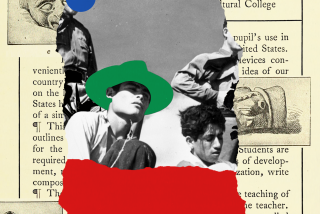New Page in the Tale of Russia : No longer propaganda tools, history textbooks offer candid portrait of communist rule
- Share via
“Happy the people whose annals are blank in history books,” wrote Thomas Carlyle. The Russian people possess a long history, a lot of it harsh and painful, much of it long kept officially distorted, little of it notably happy. In the perestroika era of the late 1980s, as the Soviet Union moved toward greater openness in its public life, Mikhail S. Gorbachev said the time had come to begin filling in the blank pages of that history. What he meant was that the time had come to start letting people know at least more of the truth about their past and especially what had really happened over the more than 70 years of communist rule.
The process of truth-telling began simply by discarding most of the books that were dedicated largely to singing the unqualified praises of communism. The next step was to write texts to replace them. Revising the history books has been a slow task. Now, three years into Russia’s post-communist age, students in all of Russia’s 67,000 schools are at last to begin seeing texts that offer a picture of the nation’s modern history sharply different from what their parents and grandparents were taught.
Vladimir Lenin, officially revered since his death in 1924, is now portrayed as a political leader who sanctioned terror and set the stage for the sweeping crimes of the Stalin era. The Stalin period itself is summed up as being based on “exploitation similar to semi-serfdom or even slavery.” The 18-year reign of Leonid Brezhnev, openly referred to even before the collapse of the Soviet Union as the “era of stagnation,” is now described witheringly as a time of tolerated “burglary and robbery in the service sector,” of officials on the take, with “alcoholism and speculation, corruption and lack of discipline, apathy and careerism” as the main features of public life.
Every country, of course, uses its schools to try to inculcate certain political values and support for national institutions. In an autocratic society, which Russia for nearly the whole of its long existence has been, the most important of those values were unquestioning acceptance of authority and obedience to the will of the ruler or the ruling party. Will a new non-ideological approach to teaching history to Russia’s students help foster acceptance of political pluralism and respect for individual rights, two cornerstones of democratic progress? Any country that tries honestly to examine its history has a much better chance to avoid repeating the mistakes and follies of the past. Russia seems committed to taking the path of honest reappraisal.
More to Read
Sign up for our Book Club newsletter
Get the latest news, events and more from the Los Angeles Times Book Club, and help us get L.A. reading and talking.
You may occasionally receive promotional content from the Los Angeles Times.








